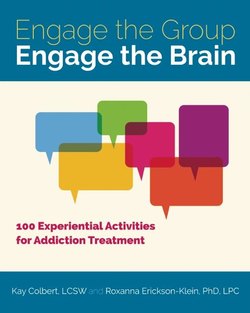Читать книгу Engage the Group, Engage the Brain - Kay Colbert - Страница 12
На сайте Литреса книга снята с продажи.
ОглавлениеOverview of the Sections
The activities in this book have been divided into six topic sections and are sequenced accordingly. The activities for each topic are listed at the beginning of that section. A complete alphabetical list of the activities is in the Appendix.
Self-Acceptance: Inventory with Unconditional Valuing of Self
Self-Awareness: Individual Strengths and Areas for Growth
Self-Responsibility: Emotional Regulation of Self Care
Communicating with Others: Expressive
Verbal and Nonverbal Connections
Being Part of a Larger Community: Participation and Developing a Sense of Belonging
Envisioning a Future of Recovery: Anticipation of Holidays and Success Over Time
The inpatient population in a treatment center is often fluid. Groups change from week to week, which presents challenges for group cohesion, as well as for following a sequential curriculum. In many ways, this flux mimics life and adapting to the challenge of change and uncertainty enhances the lessons implicit in this book.
These activities are not meant to be done in any particular order. This book is organized into a framework of six interconnected skill dimensions, each pertaining to essential skills of healthy living. As a facilitator, you may choose any activity that fits your timeframe or meets your needs on a particular day. At the beginning of each section, we have provided a brief overview on the particular topic, as well as additional observations from the authors.
The overall intention is to develop a constellation of skills that facilitate active participation in daily life, functionality, and appreciation for living. These activities encourage a process of learned self-correction, enabling the participant to make ongoing adjustments in life as circumstances change and grow beyond the addictive cycle. The central emphasis is on the growth process, development of internal resources, restructuring of the social context of interactions, and the building of healthy associations.
It is not uncommon to see individuals in early recovery have deficits in basic cognitive abilities. Whether necessary skills were never developed or they were impaired as a consequence of addiction, there is little doubt that skill building in this area enhances and regenerates individual growth and potential.
The activities presented here are intentionally simple and accessible. They rely on ordinary skills and knowledge and require only the most basic of learning. Yet each activity supports a process of change and is a framework upon which participants can continue to build and develop beyond the inpatient phase, beyond an interval of recovery, and in a natural trajectory that leads to sustained well-being.
